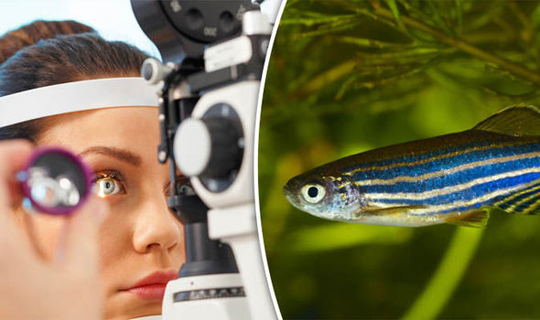Washington, Mar 11: Scientists, including one of Indian-origin, have identified a chemical signal in the zebrafish brain that helps it regenerate retina, a finding that may help cure blindness in humans.

The discovery raises the possibility that human retinas can be induced to regenerate, naturally repairing damage caused by degenerative retinal diseases and injury, including age-related macular degeneration and retinitis pigmentosa, researchers said.
"The prevailing belief has been that the regeneration process in fish retinas is triggered by secreted growth factors, but our results indicate that the neurotransmitter GABA might initiate the process instead," said James Patton, Professor at Vanderbilt University in the US.
"All the regeneration models assume that a retina must be seriously damaged before regeneration takes place, but our studies indicate that GABA can induce this process even in undamaged retinas," said Patton.
It turns out that the structure of the retinas of fish and mammals are basically the same.
Although the retina is very thin - less than 0.5 millimetres thick - it contains three layers of nerve cells: photoreceptors that detect the light, horizontal cells that integrate the signals from the photoreceptors and ganglion cells that receive the visual information and route it to the brain.
In addition, the retina contains a special type of adult stem cell, called Muller glia, that span all three layers and provide mechanical support and electrical insulation. In fish retinas, they also play a key role in regeneration.
When regeneration is triggered, the Muller glia dedifferentiate, begin proliferating, and then differentiate into replacements for the damaged nerve cells. Muller glia are also present in mammalian retinas, but do not regenerate.
Graduate student Mahesh Rao got the idea that GABA - normally a fast-acting neurotransmitter best known for its role of calming nervous activity by inhibiting nerve transmission in the brain - might be the trigger for retinal regeneration.
He was inspired by the results of a study in the mouse hippocampus which found that GABA was controlling stem cell activity.
Working with Patton and assistant professor Dominic Didiano, Rao designed a series of experiments with zebrafish which determined that high concentrations of GABA in the retina keep the Miller glia quiescent and that they begin dedifferentiating and proliferating when GABA concentrations drop.
They tested their hypothesis in two ways: By blinding zebrafish and injecting them with drugs that stimulate GABA production and by injecting normal zebrafish with an enzyme that lowers the GABA levels in their eyes.





Comments
Add new comment